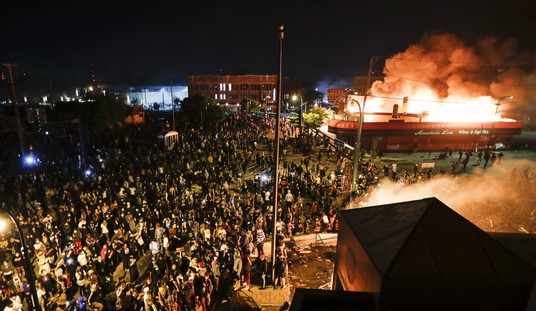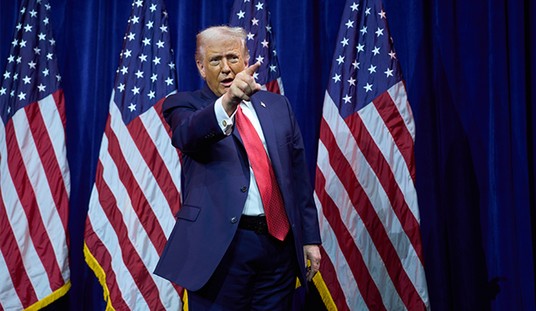In a 5-4 decision, the Supreme Court ruled today that the unlawful combatants held at Guantanamo Bay in Cuba must have access to American courts to challenge their detention. The ruling eliminates three attempts by the Bush administration and Congress to establish military tribunals that would handle the adjudication of terrorist cases without involving access to the civilian justice system:
The Supreme Court ruled Thursday that foreign terrorism suspects held at Guantanamo Bay have rights under the Constitution to challenge their detention in U.S. civilian courts.
The justices handed the Bush administration its third setback at the high court since 2004 over its treatment of prisoners who are being held indefinitely and without charges at the U.S. naval base in Cuba. The vote was 5-4, with the court’s liberal justices in the majority.
Justice Anthony Kennedy, writing for the court, said, “The laws and Constitution are designed to survive, and remain in force, in extraordinary times.” …
In dissent, Chief Justice John Roberts criticized his colleagues for striking down what he called “the most generous set of procedural protections ever afforded aliens detained by this country as enemy combatants.”
Justices Samuel Alito, Antonin Scalia and Clarence Thomas also dissented.
This will probably derail the hearings that had just begun at Gitmo for six members of the 9/11 conspiracy. By granting the unlawful combatants habeas corpus, the court has now eliminated the main reason for the military tribunal system — and for that matter, Gitmo itself. If the detainees can access American courts, they may as well be held on American soil.
The previous two rulings that struck down the tribunals forced the government to quickly pass laws that allowed for them. The Supreme Court has basically ruled that the Constitution applies worldwide rather than just to the US and its residents, which makes it pretty difficult to go back to the well a third time. Also, with very little time remaining in the Bush administration, they will not have enough time to push through a third attempt to address the Court’s concerns — and this ruling appears to be much broader than the two that preceded this one.
It seems absurd to apply criminal law to unlawful combatants captured during hostilities abroad. Will they require a Miranda reading, too? Do we have to bring the soldiers and Marines who captured them to the trial? In our 232-year history, when have we ever allowed that kind of access to enemy combatants not captured inside the US itself?
Update: Bear in mind that we do not yet have the full opinion, and it may be less egregious than what we have heard thus far. However, the quote from Kennedy certainly suggests an expansive ruling.
Squid Shark says in the comments that the work-around would be to classify them as POWs and be done with it. That presents a few problems, too. It eliminates the status of unlawful combatant, which then encourages all forces to eschew uniforms, legitimate state backing, etc etc. The unlawful-combatant designation and its circumscribed rights in Geneva intended to penalize those who hide among civilians for their attacks. Are we now to forego that?
Update II: The opinion can be read here. From a cursory reading, the Court says that Congress cannot act to suspend habeas corpus except through the Suspension Clause, which requires an explicit act noting invasion or rebellion. Would infiltration suffice, or does Congress even need that much reason to invoke the Suspension Clause?
Scalia’s dissent is especially scathing:
Today the Court warps our Constitution in a way that goes beyond the narrow issue of the reach of the Suspension Clause, invoking judicially brainstormed separation-of-powers principles to establish a manipulable “functional” test for the extraterritorial reach of habeas corpus (and, no doubt, for the extraterritorial reach of other Constitutional protections as well). It blatantly misdescribes [sic] important precedents, most conspicuously Justice Jackson’s opinion for the Court in Johnson v. Eisentrager. It breaks a chain of precedent as old as the common law that prohibits judicial inquiry into detentions of aliens abroad absent statutory authorization. And, most tragically, it sets our military commanders the impossible task of proving to a civilian court, under whatever standards this Court devises in the future, that evidence supports the confinement of each and every enemy prisoner.
The Nation will live to regret what the Court has done today. I dissent.
Update III: I’ve read through both dissents, and I have to say that I’m struck by the tone of Scalia and Roberts. Not only do they dissent, they practically accuse the majority of deliberately misreading both law and precedent, especially regarding Eisentrager. They point out that the dissent in that case explicitly noted that the decision gave aliens in detention by American forces outside of our own sovereign territory no habeas rights at all, and yet the majority used it to apply those rights in this case. Roberts scornfully argues that the Court “cashiered” the military tribunal system before it had a chance to show that it addressed detainee rights properly.
I’d say that the end of this session couldn’t come quickly enough for these justices.







Join the conversation as a VIP Member